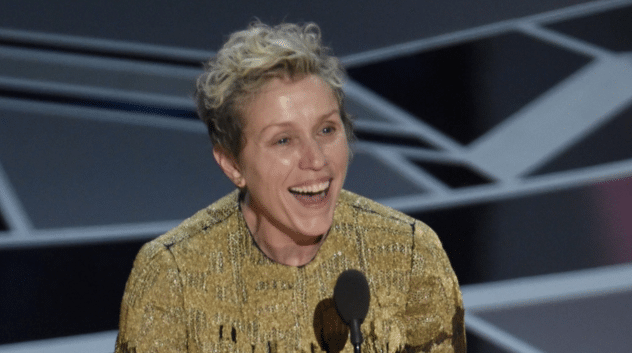“This isn’t just an issue for the film industry and their awards ceremonies”
Marking last week’s International Women’s Day, Professor Kiran Trehan writes for the Birmingham Business School Blog:
So what is the inclusion rider?
The final wards of Frances McDormand (pictured), the Best Actress winner, at the Oscars this year — “I have two words for you: inclusion rider” — have been a focal point for media attention. A new film in the making? A new award category?
McDormand was referring to a concept, explored by Stacy L. Smith in 2016 about equality clauses in the film industry. Incorporation of “inclusion riders” in the contract of an A-list actor can open the door for greater diversity in smaller roles on screen and behind the scenes. Underpinning these reforms is the desire to create a diverse and inclusive workforce which reflects the society in which we live and work.
In all walks of life, there is ongoing discussion of gender exclusion and the lack of representation of women in senior roles. In businesses, charities, public organisations, and other walks of life, diversity in leadership is notable for its absence. So in response to the debates around the Oscars, we should not forget that this isn’t just an issue for the film industry and their awards ceremonies, but one throughout our daily lives. Can we really continue to use the pipeline excuse of a lack of women in less senior positions, ready to take the next step, when in many cases women account for the majority of the workforce?
Initiatives like the “inclusion rider” are welcome but they are not new. With affirmative action and other diversity tools used in many organisations for decades, why are we are still in this situation of women being under-represented? We should be looking at what has created and continues to create this problem and find ways to act to change the inclusion crisis.
Research which we are undertaking for the West Midlands Combined Authority leadership commission, set up by Birmingham Mayor Andy Street, examines the state of leadership in the region and the factors which shape diversity and inclusion across sectors. Inclusion is much more than simply increasing racial, national, gender or class representation, and recruiting and retaining more people from traditionally under-represented identity groups. The focus on economic and social benefits is equally important. Inclusion matters, but it requires a move from the current rhetoric about “changing systems”, through isolated or episodic initiatives, to collective institutional action.
In 2019, will the Oscars and International Women’s Day still be talking about gender inequality, lack of female leaders, and the gender pay gap? Or will the award finally go to The Inclusion Rider?

